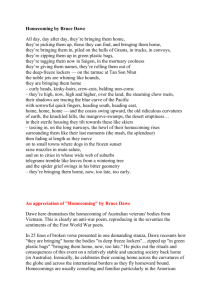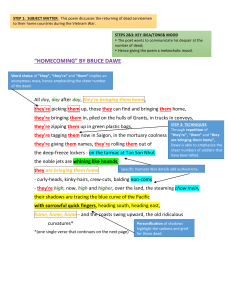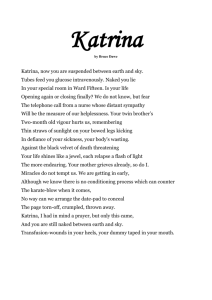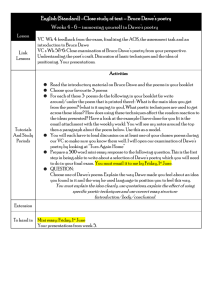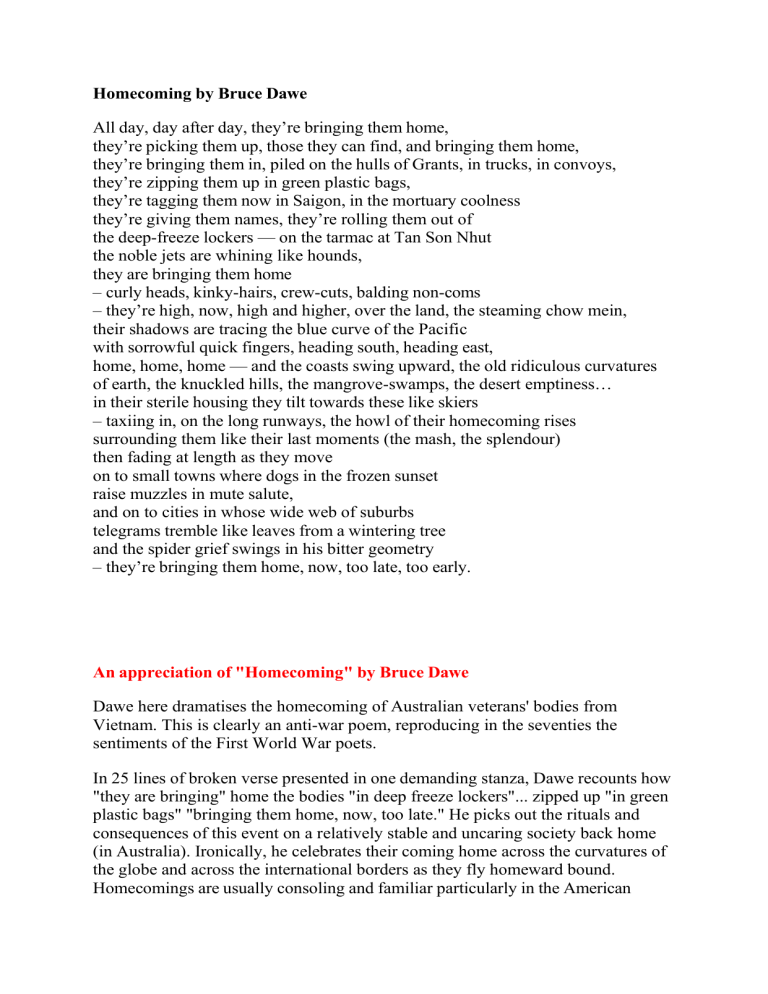
Homecoming by Bruce Dawe All day, day after day, they’re bringing them home, they’re picking them up, those they can find, and bringing them home, they’re bringing them in, piled on the hulls of Grants, in trucks, in convoys, they’re zipping them up in green plastic bags, they’re tagging them now in Saigon, in the mortuary coolness they’re giving them names, they’re rolling them out of the deep-freeze lockers — on the tarmac at Tan Son Nhut the noble jets are whining like hounds, they are bringing them home – curly heads, kinky-hairs, crew-cuts, balding non-coms – they’re high, now, high and higher, over the land, the steaming chow mein, their shadows are tracing the blue curve of the Pacific with sorrowful quick fingers, heading south, heading east, home, home, home — and the coasts swing upward, the old ridiculous curvatures of earth, the knuckled hills, the mangrove-swamps, the desert emptiness… in their sterile housing they tilt towards these like skiers – taxiing in, on the long runways, the howl of their homecoming rises surrounding them like their last moments (the mash, the splendour) then fading at length as they move on to small towns where dogs in the frozen sunset raise muzzles in mute salute, and on to cities in whose wide web of suburbs telegrams tremble like leaves from a wintering tree and the spider grief swings in his bitter geometry – they’re bringing them home, now, too late, too early. An appreciation of "Homecoming" by Bruce Dawe Dawe here dramatises the homecoming of Australian veterans' bodies from Vietnam. This is clearly an anti-war poem, reproducing in the seventies the sentiments of the First World War poets. In 25 lines of broken verse presented in one demanding stanza, Dawe recounts how "they are bringing" home the bodies "in deep freeze lockers"... zipped up "in green plastic bags" "bringing them home, now, too late." He picks out the rituals and consequences of this event on a relatively stable and uncaring society back home (in Australia). Ironically, he celebrates their coming home across the curvatures of the globe and across the international borders as they fly homeward bound. Homecomings are usually consoling and familiar particularly in the American culture where "home' acquires very many strong associations of rest, trust and identity. But here the term is deliberately turned upside down as the dead return home - a telling commentary on the VN war and what it destroyed. The diction is plain like prose, the pace is relentless and the tone is ironic. The drama of the historic present moment is expressed in many present participles: "picking... bringing....rolling ... whining..." In 25 lines, the poet drives us across many details, many particulars in the fixed drama of death. Dawe's point of view is not uncritical. We are enjoined not to be passionless spectators but to feel this great injustice to our young men. The irony is that the young are brought back to the old ridiculous curvatures of our old continent's coasts and into the cities and small towns where they were raised. Thus a spider web of grief "in his bitter geometry" spreads across the land catching us all. Dawe uses powerful oxymorons to highlight the bitterness and irony of what is happening: "sorrowful quick fingers heading south", and "bringing them home now, too late, too early" to emphasise that their return is premature and "the mash, the splendour" their napalm deaths are unnatural paradoxes. Dawe drives home the conviction that the whole war is a contradiction: "(dead) fingers are tracing a course southwards" and "the howl of their homecoming" (in the jet engines) mocks a ticker tape parade they are owed if they had returned as homecoming living victors. No wonder they receive only "mute salute" from dogs not their fellow countrymen. I like it when a poem has a central focus. Dawe's deft writing plays powerful chords on our emotions: the injustice of killing young men and its overwhelming reality is delivered in many observable details. Rather than say I enjoyed this poem, let me say I appreciate what it is doing and rate it a powerful indictment of Australian involvement in Vietnam. It is a memorable poem. by G. Smith 26/8/97; 486 words Notes on Bruce Dawe from Outrider pp. 82-97. speech of the commonplace and suburban poetry for the common man working class origins, born 1930 Geelong variety of jobs and self taught, part time study combination of sympathy and satire his battlers are elevated to myth disturbs the reader's sense of familiarity many of his poems are elegiac successes "a painful lack of social awareness in (Australian) poetry" "exposes what he sees as a dehumanising forces, and so to defend and celebrate individuality' self critical, a vulnerable vernacular poet use of dramartic monologue (Good Friday) his faults: sentimentality nd simplicity poets catches himself on the edge of belief satirise and celebrate football (Lifecycle) concerned about the destructive tendencies in television (Not So Good Earth) Homecoming is more elegy than satire; predominantly elegiac mood gives the individual a true voice ample use of ambivalence battler mythology Australian nostalgia for myth
